Добро пожаловать, граф Картошка! Jagaimo-san, Irasshai! ジャガイモさん、いらっしゃい!Welcome Mr Potato!
October 21, 2009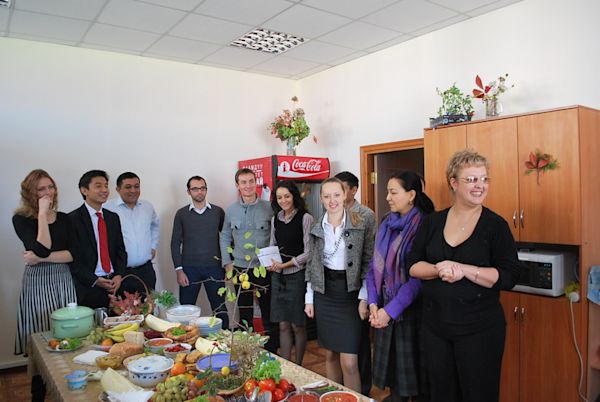
By Rob Packer, KF9 Kyrgyzstan
Inter-Cultural Exchanges in Kyrgyzstan
The words ikebana and prazdnik started spreading around the offices of Mol Bulak Finance, my MFI last week. Prazdnik was the easy part: it means holiday, festival or party in Russian, but the word ikebana was new to me. My first thought was “That word sounds a lot like the Japanese art of flower arrangement!” and then decided it didn’t really sound all that Russian, and used my limited knowledge of Kyrgyz (eki means two) to convince myself it must be Kyrgyz. When I asked I was met with shocked expressions and told it really was the Japanese word and that on Thursday flowers would be arranged, or lunch prepared.
It doesn’t sound like exactly what you’d expect from an office harvest festival in Bishkek, but two weeks in Kyrgyzstan have taught me to expect the unexpected. On my first commute to work, my jaw hit the floor when I saw how close the mountains were to the city. And on my first walk around town, I was struck by the unexpected ethnic diversity of the city: Kyrgyz, Koreans, Germans, Chinese, Russians, Pakistanis, Armenians, Tatars, Tajiks, all or mostly speaking Russian or Kyrgyz. In Bishkek, it sometimes really does feel like you’re in the heart of the vast landmass called Eurasia. In the West, we normally think of the former Soviet Union as being quite an ethnically homogenous place, but looking over its often brutal history, it suddenly seems to make sense that a country, which stretched from Finland, and Turkey to Afghanistan, China and Korea and one that had such a long and problematic history of forced resettlement and less forced relocation, would end up with this diverse group of people living there. Since independence in 1991, the picture has changed with a lot of ethnic Germans returning to Germany after over 200 years living in Russia, the USSR and its successor states, to be replaced by an international student community, including a large contingent of medical students from India and Pakistan, according to my local Russian teacher. It may go even deeper, and I like to think it does, than Stalinist or tsarist excesses and reaches back into Central Asia’s heritage as the land of the Silk Road where merchandise and beliefs were traded for millennia before.
So maybe a Japanese-inspired harvest festival makes perfect sense after all. By the time the celebration arrived, the weather was starting to turn and I was coming down with a cold, so rather than searching for the ingredients for a Thai green curry in my local Narodny supermarket (the other flipside of being so close to the world’s tallest mountain ranges is that food doesn’t come from the other side), I decided to choose the flower arranging alternative. For its poor performance as a piece of ikebana, I kept loyal to the Kiva brand (see the photos). Almost everyone else seemed to have stayed up all night making food: among other things, there was tempura, beetroot, salads, meat-filled lepyoshka, dumplings and home-made jam.

Everyone waiting patiently for the prazdnik to start
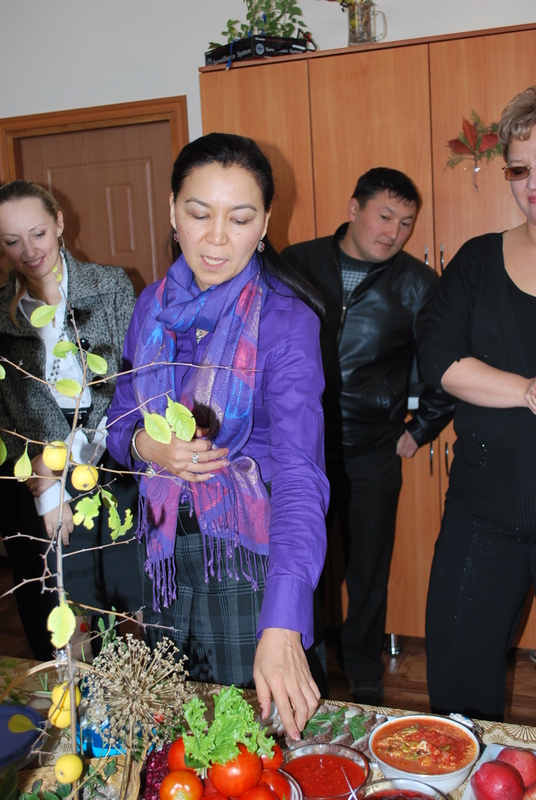
Altynay explains her diversified portfolio, one of the many to have brought along multiple dishes
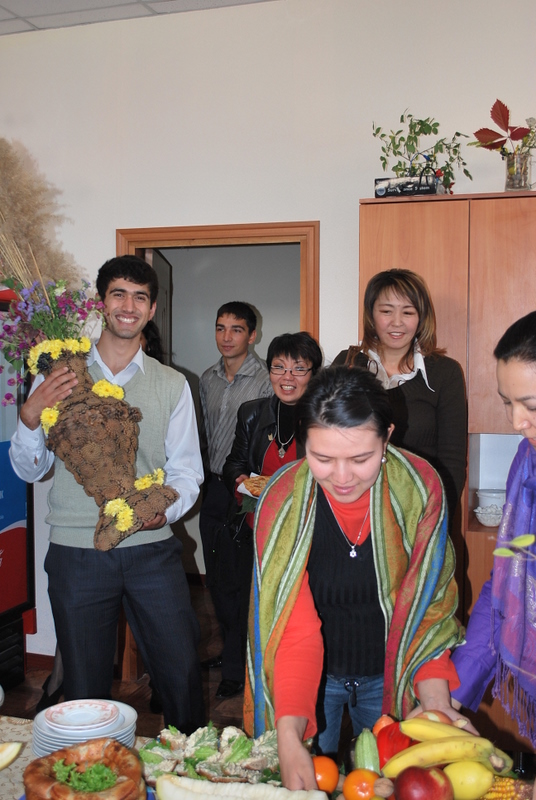
The Kant office steal the show with their amphora made of pine cones
After the food and ikebana had been introduced, it was time for the fruit and vegetable based awards: MBF’s CEO was awarded a big tomato, the Chief Credit Officer a lemon, the Business Development Director a bunch of grapes, the Credit Manager an onion, and the Kiva Fellow a potato. And why? Because I arrived in autumn, the time of year when the potato comes into its own here in Central Asia.
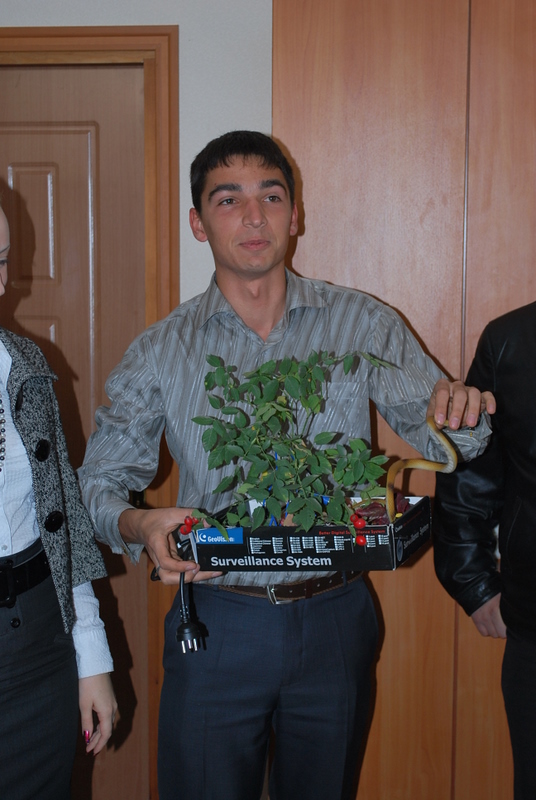
Tolik demonstrates his innovative techno-ikebana
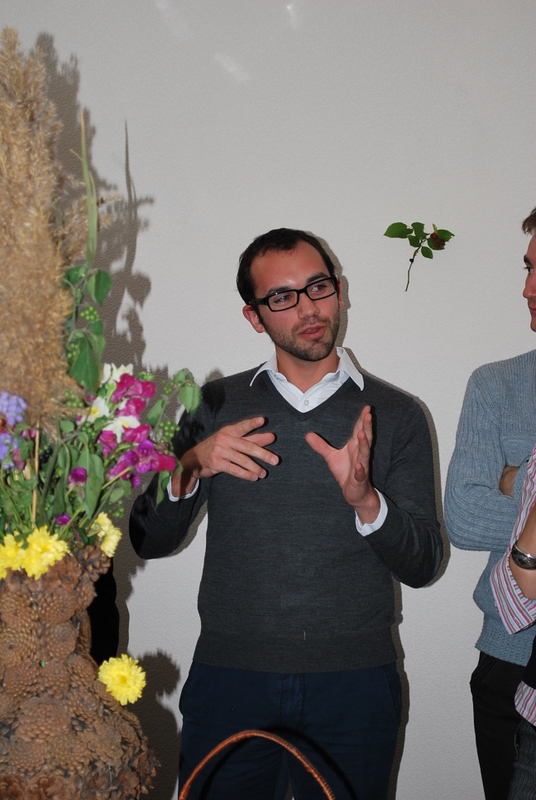
Mr Potato trying to find the right Russian word to explain the Kiva-inspired ikebana
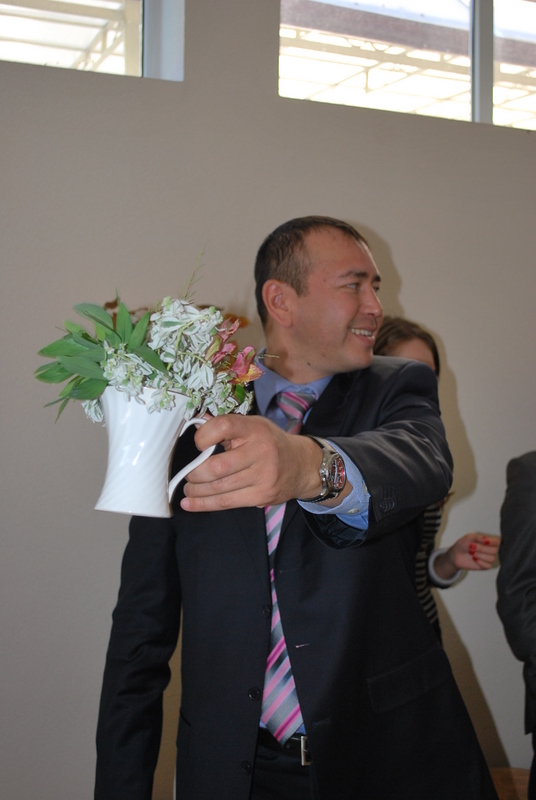
Babur shows everyone the Kiva-inspired ikebana
Thanks to Nadezhda Kuzminykh of Mol Bulak Finance for taking all the photos and to my friend, Hayden for his translation of the title.
Rob Packer is a Kiva Fellow currently working with Mol Bulak Finance in Bishkek, Kyrgyzstan. Check out and lend to their entrepreneurs on Kiva.org, or join the Kyrgyzstan lending team.
/>













